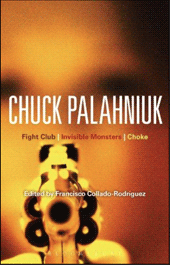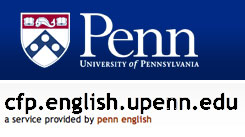Welcome to SAAS
Call for Papers website provided by the Department of English at the University of Pennsylvania
Free access to courses taught by distinguished teachers and scholars at Yale University.
Chuck Palahniuk: Fight Club, Invisible Monsters, Choke (2013). Ed. by Francisco Collado.

Call For Papers for Our Next Conference
"The Image and the Word"
PANEL 24
24) "Better to Fail in Originality Than to Succeed in Imitation': Herman Melville's Dialogue with Literature, Visual Arts and Film
Panel Chair: María Laura Arce Álvarez, Universidad Autónoma de Madrid
E-mail: laura.arce@uam.es
This panel celebrates Herman Melville's Bicentenary (1819-1891) through his fiction and poetry and how his remarkable works, characters and philosophical precepts have inspired new forms of expression in the contemporary visual arts.
Together with Edgar Allan Poe and Nathaniel Hawthorne, Herman Melville was one of the representatives of the American Renaissance whose work became fundamental for later generations of American writers. He proposed in his short stories and novels a philosophical discussion that to a certain extent explained the American existential crisis of the time, of the modern times and especially of the postmodernist era. Many postmodernist writers have looked back to Melville, his plots and characters, to rewrite and reshape their works in a postmodern context. Melville's fiction could explain the postmodern existential crisis that writers were so eager to express.
Some of his short stories, such as "Bartleby, the Scrivener" (1853), became an illumination for structuralist critics and philosophers such as Maurice Blanchot who were working with the concept of refusal, negation and the literature of silence (Hassan The Dismemberment of Orpheus, 1971). Indeed, Blanchot concludes that Melville, like Kafka, "gives us … a sort of combat through literature for literature: a struggle which is-and is at the same time-its aim" (Blanchot, Writing of the Disaster, 1995).
This panel welcomes papers that address and discuss how Herman Melville's work interacts with media, visual arts and films in the following, but not limited to these, issues:
- Melville’s influence in the film industry
- Melville’s works adaptation to cinema
- The linguistic discussion of Melville’s works and its contribution to the concept of image
- Melville’s dialogue with the visual arts
- Adaptations of Melville’s works into other genres
- Melville’s works legacy in postmodern theorizing
GUIDELINES FOR PARTICIPANTS
Please submit all paper proposals directly to the Panel Chair using this form no later than October 15, 2018.
Panel Chairs will notify applicants of their acceptance/rejection no later than November 15, 2016.
For information on the Conference Venue see the Organizing Committee's website.
SAAS members, ASA members, and other scholars (not necessarily affiliated with any of these associations), are invited to submit proposals to the panel of their choice. Donwload this form, fill it out, and send it via email to the chair of your selected panel.
In order to present a paper, participants who are not SAAS, ASA, APEAA or HELAAS members will be required to pay a one year's membership fee (and enjoy the benefits for the following year) plus the conference fee.
Students have to become SAAS members (if they are not SAAS/ASA/APEEA/HELAAS members already) and pay 50 percent of the registration fee (60€ early bird/75€ late registration) if they wish to present a paper and/or attend the "Félix Martín" Doctoral Seminar.
Deadline: October 15, 2018
Further guideliness for participants can be found here.









